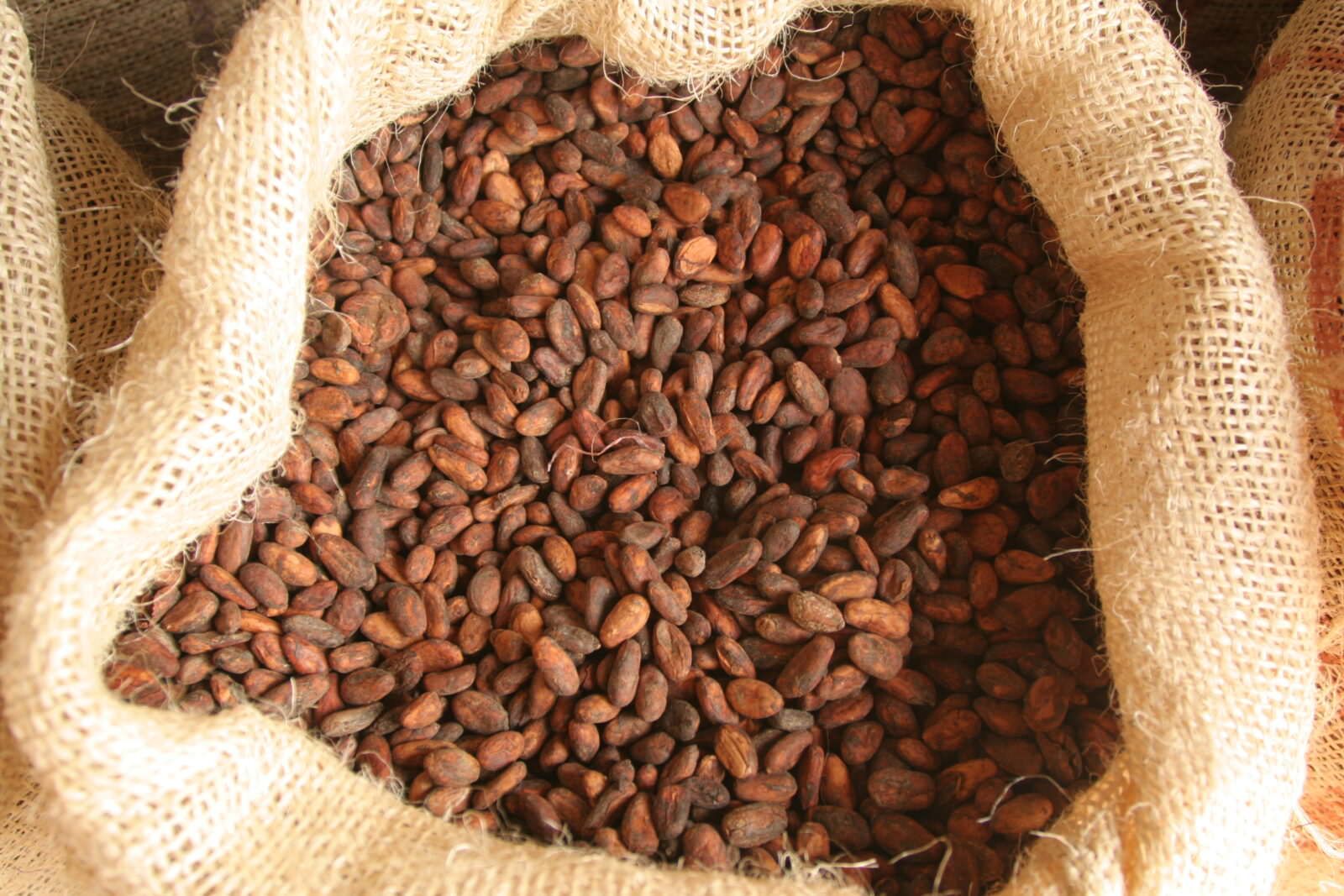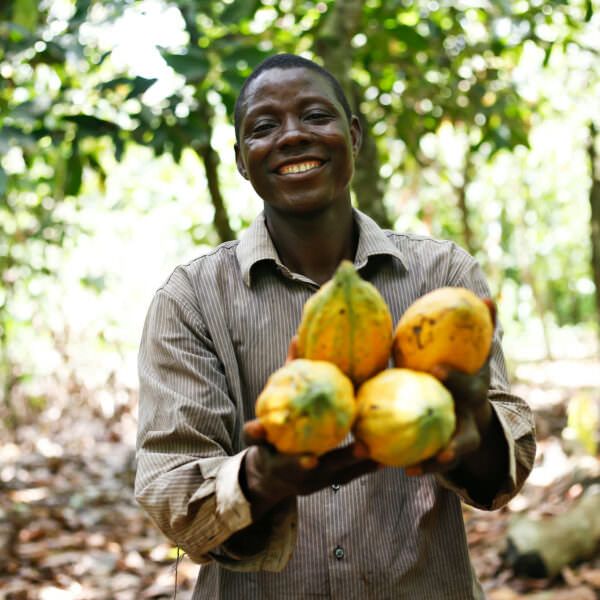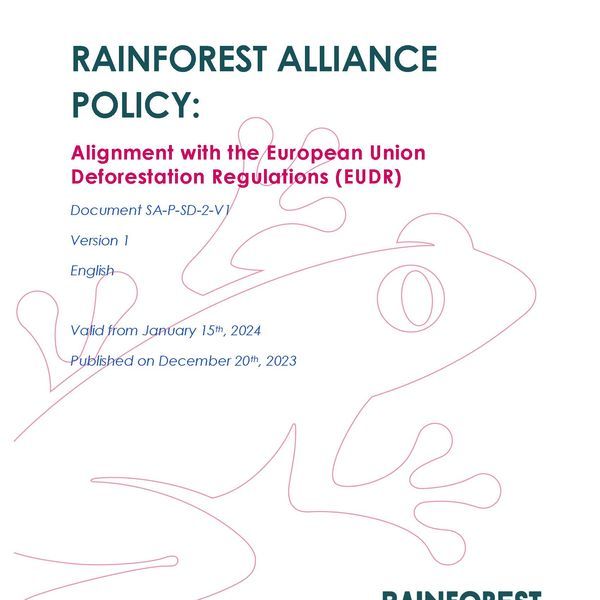This Q&A has been developed to provide guidance to certificate holders and certification bodies with regards to the Measures to Strengthen the Cocoa Sector.
This Q&A makes reference to requirements in the Policy For Farm and Chain Of Custody Certification In Cocoa In West Africa published in April 2020 and updated July 2022.
More information on the Audit Allocation system can be found here.
For questions about the use of the new Rainforest Alliance certification seal on cocoa products, please visit FAQ: New Rainforest Alliance Certification Seal.
Cap on group growth
Is there still a cap on group growth for groups going through the first certification year audits against the 2020 Rainforest Alliance Farm standard?
Yes there is a cap on the growth in group membership for Ghana, Côte d’Ivoire, Nigeria and Cameroon. The details of this can be found in clause 1.A. 1.4 of the Policy for Farm and Supply Chain Certification in Cocoa V3.
- For groups with less than 2000 producers, the total number of certified producers in a group shall only grow by 30% over the whole certification year in comparison to the total number of certified producers in the previous certification year (certification audit and/or extension audit).
- Groups with more than 2000 producers shall only grow by 10% over the whole certification year in comparison to the total number of certified producers in the previous certification year (certification audit and/or extension audit)
Geolocation data
What are the current geolocation data requirements for cocoa groups in West Africa?
For all first certification audits taking place from 1st July 2023 to 30th June 2024, Certificate Holders must provide geolocation data for the largest farm unit for 100% of the farms. For at least 10% of the largest farm unit, this is in the form of a GPS polygon (this requirement is aligned with requirements 1.2.12 and 1.2.13 of the SAS).
For details on geodata please see Annex Chapter 1 & Guidance Document D: Geolocation Data Requirements and Risk Maps.
(Note: requirement 1.2.12 applies to small farms and requirement 1.2.13 is applicable to all large farms)
New groups joining the Rainforest Alliance from 2024 onwards must comply with requirement 1.2.b for their certification audit. For example: a new group has their first certification audit in 2024. They must comply with the requirement 1.2.b: CH must provide geolocation data for 100% of the farm units. For at least 30% of farm units this is in the form of a polygon. A polygon must be available for every farm unit that is 4 hectares or more (in accordance with the requirements of the EUDR).
All Farm Certificate Holders (CH), whatever their crop or location, need to submit their Group Member Registry (GMR) on the Rainforest Alliance Certification Platform (RACP) prior to the audit to obtain their deforestation and encroachment risk analyses.
Government ID
Which specific governmental ID is being requested in the Group Member Registry (GMR)?
All groups need to indicate in the new GMR template (Annex S13, tab 1. Farm information, column M) the National ID number of each group member which has this information available.
i. For the first certification audit, certificate holders in Côte d’Ivoire and Ghana must indicate the National ID number for at least 40% of group members
ii. For the first surveillance audit, certificate holders in Côte d’Ivoire and Ghana must indicate the National ID number for at least 60% of group members
iii. For the second surveillance audit, certificate holders in Côte d’Ivoire and Ghana must indicate the National ID number for at least 100% of group members
Auditors will check the accuracy of the information in the GMR during the audit and raise a non-conformity if any discrepancy is found between what is indicated therein and what is cross-checked at producer level. The auditor will also raise a non-conformity if, during the audit, it is found that a group member is in possession of a national ID and that this was not indicated in the registry.
Type of national ID requested per country
Ghana
- Groups need to indicate the personal ID number of group members which is shown on the Ghana Card. Therefore the number indicated in the GMR shall be the 13 digit number under ‘personal ID number’ as shown on the front side of the card.
Côte d’Ivoire
These are the options for groups:
- If the group member is in possession of the new national identity card (Carte Nationale d’Identité – CNI), the NNI (Numero National d’Identification) on the flip side of the card must be indicated.
- If the group member is not yet in possession of the new identity card (CNI), the “numéro d’immatriculation” which can be found either on the old National Identity card (Carte Nationale d’Identité) or on the voter’s card (Carte d’électeur), must be indicated.
- For non-Ivorian group members, the GMR needs to show the number indicated on their residency card (Carte consulaire for Burkina Faso and NINA for Mali).
Nigeria
Groups need to use the 11-digit National Identity Number (NIN) in the GMR for their group members. The NIN can be found on the National Identity Number slip issued to every citizen who has enrolled with the national identity management commission.
Cameroon
Any of the ancient, provisory or new national ID formats will be accepted in the GMR for group members.
Detailed information on the type of national ID requested (including images) can be found in the Instructions for Cocoa Groups in Ghana, Côte D’Ivoire, Cameroon, and Nigeria on National Identification Requirements which can be consulted through the link on Instructions for Cocoa Groups in Ghana, Côte D’Ivoire, Cameroon, and Nigeria on National Identification Requirements.
What should be indicated in the group member registry if group members do not possess or have lost their ID card? Or if the only proof of identity available is different than the one requested by Rainforest Alliance?
If some group members do not yet have the National Government ID or the proof of identity as indicated by the Rainforest Alliance, then this cell should be left blank for that group member only (Column O – 15. National ID Number). However, groups are expected to get those group members to start the administrative process as soon as possible to obtain their government ID.
For cocoa farm CH in Côte d’Ivoire and Ghana, please see the Policy for Farm and Supply Chain Certification in Cocoa v3 on the minimum percentage of group members which should indicate their government ID in the registry.
For further guidance on which government ID to indicate per country, consult the Rainforest Alliance Instructions for Cocoa Groups in Ghana, Côte D’Ivoire, Cameroon, and Nigeria on National Identification Requirements.
Audit Allocation
What is the latest on audit allocation for audits during first certification year (2023 – 2024)?
Since June 2022, Rainforest Alliance has suspended audit allocation in Côte d’Ivoire. Cocoa groups in Cote d’Ivoire who want to apply for an audit must upload their GMR and contract a Certification Body authorized by Rainforest Alliance. Find the list of authorized certification bodies in the link here.
Audit allocation remains applicable to cocoa groups in Ghana.
How will the audit allocation in Ghana work for the audit season starting 1st July 2023?
The audit allocation process will be in effect for all new and existing cocoa farm certificate holders in Ghana from July 1st 2023 .
In order to be allocated for the October 2023 harvest, all cocoa groups in Ghana must have already registered on the Rainforest Alliance Certification Platform. It is essential that registration is done thoroughly to ensure that groups receive the correct contextualized checklist for their operations. This will ensure thorough preparation is done by the groups prior to their audit. Once groups have registered and been approved by the Rainforest Alliance, they must upload a complete and updated GMR. Once the GMR has been uploaded, the group will be allocated to a Certification Body. Communication to both groups and Certification Bodies on the allocation process will begin in June and continue until the beginning of the harvest.
New groups and groups with licenses expiring before September 30th, 2023, will be prioritized for both audit allocation and audits. To know more about the allocation process, please refer to the Cocoa Policy V2.3, Chapter 3.5.
Should Farm Certificate Holders remove sanctioned farmers from the GMR?
Certificate holders must keep a list of all farmers that are sanctioned at the time of the audit, including their details (name, internal farm ID, national ID (if available), phone number, farm size, production, volume sold during previous harvest, farm size, GPS coordinate, and reason of sanction).
The list must be shared with the Certification Body as part of the audit preparation documents (see requirement 3.2.f)
What is the audit process and certificate validity for Côte d’Ivoire?
Since July 1st, 2022, Rainforest Alliance has suspended the Policy for Certification timelines and Procedures for groups in Cote d’Ivoire.
This is what applies currently:
- CH in Côte d’Ivoire can have their first certification audit at any time of the year, regardless of the harvest cycle. Certification audits can be conducted from 1 January 2023 onwards.
- Certificates issued from first certification audits in Côte d’Ivoire must have the certification decision date as the start date and are valid for 3 years. The license will have the same start date and is valid for 1 year.
- Farm CH in Côte d’Ivoire must schedule their surveillance audits in compliance with the Certification and Auditing Rules
- First surveillance audit: 9 to 15 months after the certificate start date (3 months before to 3 months after the expiry date of the license)
- Second surveillance audit: 21 to 27 months after the certificate start date (3 months before to 3 months after the expiry date of the license)
What is the right time period for farm certificate holders to have their audit?
Ghana, Cameroon and Nigeria
For Certificate Holders in Ghana, Cameroon and Nigeria, the audit timelines described in the 1.2 Certification and Auditing rules apply. According to clause 1.5.29 of the rules: The (re)certification audit shall take place between 3 months before and 3 months after the start date of the harvest of the main crop to be certified.
The requirement does not specify which harvest (big or small), which means that Certificate Holders can choose if they want to conduct their audit around the October (main) harvest or the April (small) harvest. However, if the Certificate Holder wants to certify the main October harvest, they have to do the audit 3 months before or after the start date of the harvest (1 October). This means the audit should be conducted between 1 July and 31 December. All audits between 1 January and 30 June will be aligned with the April harvest, which means the certificate validity will cover 1 April to 1 April. The April certificate WILL NOT include volumes of the October 2023 season
Côte d’Ivoire
- CHs in Côte d’Ivoire can have their first certification audit at any time of the year, regardless of the harvest cycle. Certification audits can be conducted from 1 January 2023 onwards.
Certificates issued from first certification audits in Côte d’Ivoire must have the certification decision date as the start date and are valid for 3 years. The license will have the same start date and is valid for 1 year.
Farm CHs in Côte d’Ivoire must schedule their surveillance audits in compliance with the Certification and Auditing Rules. The first surveillance audit must be 9 to 15 months after the certificate start date (3 months before to 3 months after the expiry date of the license). The second surveillance audit: 21 to 27 months after the certificate start date (3 months before to 3 months after the expiry date of the license)
Cocoa policy version 3.0
Has there been any update of the Cocoa Policy?
Yes. On 1st July 2023 the Rainforest Alliance published Policy for Farm and Supply Chain Certification in Cocoa V3.0.
Version 3.0 of the Policy for Farm and Supply Chain Certification in Cocoa is now available on the Rainforest Alliance website. It replaces version 2.3 which expired on July 1st, 2023. The cocoa policy is applicable to cocoa farms and supply chain certificate holders and their certification bodies in West Africa.
The majority of requirements of the previous 2.3 version remain applicable during the full certification year (July 1st, 2022, to June 30th, 2024). The applicability of some requirements has been extended to Cameroon and Nigeria. In the same way, requirements related to audit allocation are now only applicable to Ghana. For Cote d’Ivoire, there are new requirements and a binding annex on risk level. CHs must have their audit in the harvest cycle corresponding to their risk level. Risk level has no further impact on the certification process of CHs.
MultiTrace migration
When will the current traceability systems, GIP and Marketplace, be migrated to Multitrace for cocoa?
The migration of traceability data from the Good Inside Portal (GIP) into MultiTrace is now completed.
Our traceability system supports the proposed interventions. This includes allowing for origin matching mass balance, seal use and approvals, shared responsibility and other elements of the 2020 cocoa strategy. For more details on the implementation and migration timelines please see our page on Understanding End-to-End Cocoa Traceability and the Multitrace Platform.
How do I access the volumes of my Rainforest Alliance 2020 license?
Volumes from new RA2020 (transition) farm licenses are not available in the old MultiTrace account linked to the pre-merger platforms. They can only be accessed through the traceability button in your account on the Rainforest Alliance Certification Program (RACP).
Will I still be able to access my volumes in GIP or Marketplace after the migration to MultiTrace?
After the migration you will only be able to view GIP or Marketplace in a read-only mode for traceability. You will not be able to perform any traceability related actions in the system.
What actions are needed by Certificate holders to demonstrate traceability in MultiTrace?
- Farm certificate holders are required to sell their volumes in MultiTrace in accordance with the appropriate standard.
- All certificate holders—farmers and companies—will need to log in and announce the sales, purchases, conversions, blends/mixes, manufacturing activities in the traceability platform within the timelines required by our new program.
Sustainability Differential
The Rainforest Alliance has introduced a mandatory Sustainability Differential under our new 2020 Certification program. To find out more, please visit our Supply Chain FAQ. Detailed information about the Sustainability Differential for cocoa, including a Q&A section, is available here.




